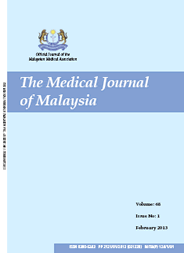MJM, Vol 70 Supplement 1 September 2015
Role of Health Professionals in Tobacco Control -
Malaysian experience 1982-2015
Faculty of Medicine and Health Science, Universiti Putra Malaysia, Serdang, Selangor
ABSTRACT
Introduction: Tobacco use is the single most preventable cause of death globally. It is deadly in any form or disguise. There is no safe level of exposure to cigarette smoke. There are about 6000 known chemicals in tobacco smoke; hundreds of these are hazardous, and at least 69 are known to cause cancer. Its use leads to more than 6 million deaths worldwide annually. The objectives of this paper presents Role of Health Professionals in Tobacco Control - Malaysian experience 1982-2015. It also highlights the role played by Action on Smoking and Health Committee, Malaysian Medical Association (ASH, MMA) and author’s experience in Tobacco Control and its impact with examples.
Results: Roles of Health Professionals: Community Leadership, Education, Advocacy, Training and Research and Clinical: A National workshop on ‘Smoking or Health’ was organised by ASH, Malaysian Medical Association (MMA) in 1983, followed by the ‘Superman’ Campaign against smoking involving 7000 school children in 1984, a National seminar on Tobacco Control in. On 5 November 1986, the first ‘National No Smoking Day’ was launched by the ASH, Committee, and MMA. This led to the organisation of National No Smoking Week every year from 1987 to 1993 by MMA. In 1998, 2000, 2002, 2004 and 2006 the International Quit and Win (No Smoking Month) in Malaysia was organised by MMA with the assistance of Ministry of Health and other NGOs. Training was conducted for healthcare workers. Advocacy role played by MMA led to the ban of smoking on Malaysian Airlines flights. These were the first major anti-tobacco efforts in Malaysia. These activities served to create awareness, bring about a change in government policy on tobacco control, promote cessation, prevent initiation, including increasing the unit price of tobacco products and implementing smoking bans through policies, regulations, and laws. Prof. Dr. Lekhraj Rampal and Dr Teoh Soong Kee played a very significant role during this period. The Malaysian Council on Tobacco Control play an important advocacy role. The Ministry of Health through its Tobacco Control Unit and FCTC Secretariat, Health Offices and more 300 quit smoking clinics and 32 hospitals continue to play the lead role in smoking prevention and cessation. All these activities have contributed to decline in the prevalence of smoking. Catalyst Role, Advocacy Role: The Cabinet of Ministers Malaysia in 2002, agreed with the suggestion of MMA to increase tax on tobacco and tobacco products and use the extra funds to establish foundation to provide funding for tobacco control health promotion and cessation activities. The establishment of Malaysian Health Promotion Board was passed by parliament and gazette in 2006.
Conclusion: Health Professionals in Malaysia have played a significant role and have taken several steps forward in tobacco control in Malaysia. We All Have A Role to Play. We need to work together locally and globally to achieve “A Tobacco Free World”.
